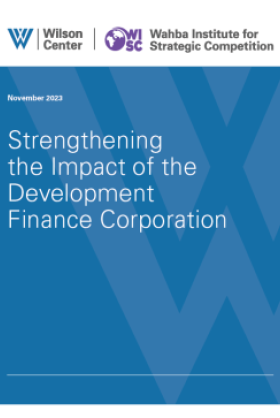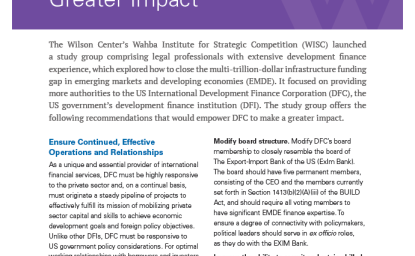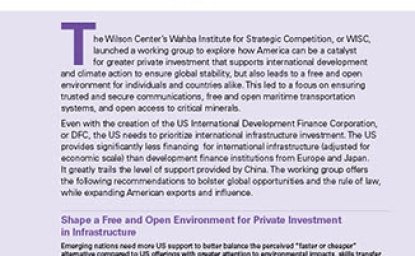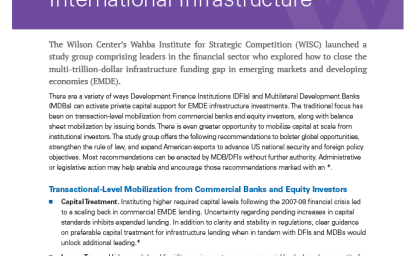Strengthening the Impact of the Development Finance Corporation


The Wilson Center’s Wahba Institute for Strategic Competition launched a study group comprising legal professionals with extensive development finance experience. The group examined how to close the multi trillion dollar infrastructure funding gap in emerging markets and developing economies and offers recommendations that would help the US International Development Finance Corporation (DFC) have a greater impact on efforts to close the gap.
The US government (USG) has many tools at its disposal, including official development assistance (ODA) (e.g.,
services, technical assistance, and grants), export credit (e.g., loans, loan guaranties, and political risk insurance
(PRI)), and development finance (e.g., equity, loans, loan guaranties, and PRI). ODA is vital to creating good
enabling environments and facilitating early project development. The USG’s model for development also relies
on development finance and export finance, which mobilize the private sector to invest alongside the USG,
effectively leveraging the development and export finance with private capital. The two agencies that use these
tools are the Export-Import Bank of the United States (EXIM Bank) and the DFC.
The Legal Working Group focused on the DFC, the USG’s development finance institution (DFI). It was created
under the Better Utilization of Investments Leading to Development Act of 2018 (BUILD Act), to replace its first
DFI, the Overseas Private Investment Corporation (OPIC), which began operations in 1971 under the Foreign
Assistance Act.
The BUILD Act gave DFC several important tools that the OPIC did not have, primarily authority for equity
investment and technical assistance, additional capacity (doubling OPIC’s $29B to $60B), and a longer
authorization period (increasing it from one year to seven years).
These additional tools are important, but more steps are needed to make the DFC even more competitive
and effective. The study group offers the following recommendations that would empower the DFC to make a
greater impact.
The involvement in the working group does not constitute each participant endorsing each recommendation listed, nor the contents of this publication. Their input was invaluable in providing insights from those with intimate knowledge of international infrastructure. The Wahba Institute of the Wilson Center is grateful for their contributions.
Amy Bailey - Attorney Specializing in International Finance and Private Equity; former Associate General Counsel, Development Finance Corporation
Julien Blanchard - Columbia Law School
Peter F. Fitzgerald - Of Counsel, Norton Rose Fulbright US LLP; former Associate General Counsel for Finance and former Associate General Counsel for Insurance, Overseas Private Investment Corporation
To see the 1-pager based on this document, click here.

Wahba Institute for Strategic Competition
The Wahba Institute for Strategic Competition works to shape conversations and inspire meaningful action to strengthen technology, trade, infrastructure, and energy as part of American economic and global leadership that benefits the nation and the world. Read more

Explore More
Browse Insights & Analysis
Empowering Development Finance Corporation for Greater Impact




